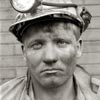Documentary Photography - Taff Merthyr Colliery


Welsh artist and photographer, Andrew Johnson, spent four years working empathically alongside the miners of Taff Merthyr Colliery, South Wales, until its closure in 1993 and produced a large body of documentary photography which was widely exhibited nationally.
Taff Merthyr Colliery saw times not only of great prosperity and productivity, but also periods of despair. Technological and geographical difficulties often accounted for falls in productivity, where pits were deemed to be uneconomic, and could be closed within a period as short as three months. This was the Official Review Program! Contracts with the newly privatized electricity companies soon expired; subsidized foreign coal was now in competition with unsubsidized British Coal. The miners fought hard to keep the pits open, frequently increasing productivity by 200- 300 per cent which was never enough for the government. He saw many miners taking voluntary redundancy, it was their easiest way out of the uncertainty that being a miner had become for them.In 1984 the the workforce in the South Wales coalfield was over 22,000 men. No deep coal mines are now left in the South Wales Valleys since the closure of Tower Colliery in 2008. Tower Colliery was bought by the miners in 1994, despite government attempts to close it having deemed it uneconomic
Through his work at the colliery he experienced the much renowned local community spirit and identity which underwent massive social upheaval during those turbulent times. Major, political influences were to reshape the life of a generation of people. It was the end of an era and their way of life was to change forever.
Human values are very important to him and he was deeply moved to make a body of work that strongly expressed understanding and compassion. His photographic philosophy was morally bound to representing a reasoned voice of expression for the many people that were becoming, 'socially obsolete' through political policy. Historically, the decimation of the coal industry and the NUM represented a major shift in politics, consolidating a programme of Neoliberalism.
My extended thanks to Harvey Holton, Poet In Residence at Duncan of Jordanstone College of Art, Dundee, for his invaluable input in creating the integral text works.